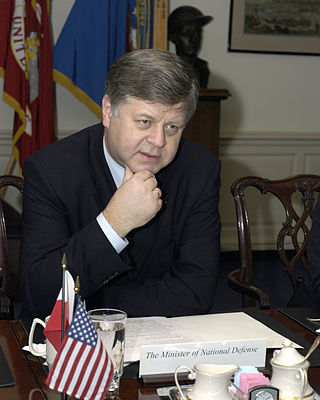
Jerzy Andrzej Szmajdziński was a Polish politician who was a Deputy Marshal of Polish Sejm and previously served as Minister of Defence. He was a candidate for President of Poland in the 2010 election.
This article discusses the organizational and administrative structure of the Polish–Lithuanian Commonwealth.

A sejmik was one of various local parliaments in the history of Poland and history of Lithuania. The first sejmiks were regional assemblies in the Kingdom of Poland, though they gained significantly more influence in the later era of the Polish–Lithuanian Commonwealth. Sejmiks arose around the late 14th and early 15th centuries and existed until the end of the Commonwealth in 1795, following the partitions of the Commonwealth. In a limited form, some sejmiks existed in partitioned Poland (1795–1918), and later in the Second Polish Republic (1918–1939). In modern Poland, since 1999, the term has revived with the voivodeship sejmiks, referring to the elected councils of each of the 16 voivodeships.
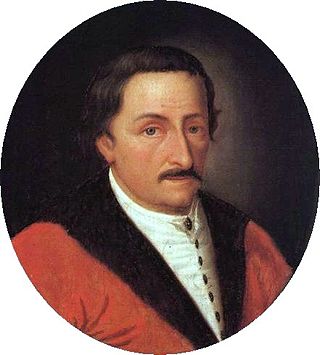
Andrzej Maksymilian Fredro was a Polish szlachcic and writer.
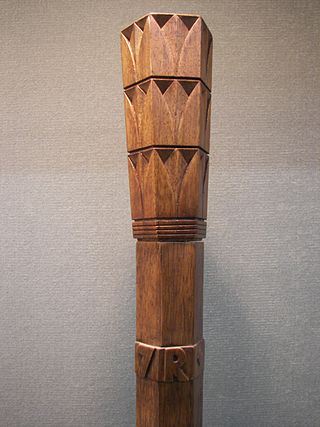
The Marshal of the Sejm , also known as Sejm Marshal, Chairman of the Sejm or Speaker of the Sejm is the speaker (chair) of the Sejm, the lower house of the Polish Parliament. The office traces its origins to the 15th century. In modern Poland, the full title is Marshal of the Sejm of the Republic of Poland.

Marszałek was one of the highest officials in the Polish royal court since the 13th century and the Grand Duchy of Lithuania since the 15th century. He was the oldest-ranking of all court officials and was considered the most important advisor to the King of Poland.

Bronisław Maria Komorowski is a Polish politician and historian who served as President of Poland from 2010 to 2015.

Ludwik Stanisław Dorn was a Polish conservative politician, who served as Deputy Prime Minister and member of Sejm elected on 5 November 2007.

Elżbieta Barbara Witek is a Polish politician and former Minister of the Interior and Administration, in office from June 2019 to August 2019, currently serving as the Marshal of the Sejm. First elected to the Sejm on 25 September 2005, obtaining 7476 votes in 1 Legnica district as a candidate on the Law and Justice list. She was voted Marshal on 9 August 2019.
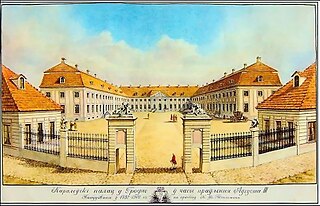
Grodno Sejm was the last Sejm of the Polish–Lithuanian Commonwealth. The Grodno Sejm, held in autumn 1793 in Grodno, Grand Duchy of Lithuania is infamous because its deputies, bribed or coerced by the Russian Empire, passed the act of Second Partition of Poland. The Sejm started on 17 June and ended on 23 November 1793. It ratified the division of the country in a futile attempt to prevent its subsequent complete annexation two years later in the 1795 Third Partition of Poland.

Silesian Parliament or Silesian Sejm was the governing body of the Silesian Voivodeship (1920–1939), an autonomous voivodeship of the Second Polish Republic between 1920 and 1945. It was elected in democratic elections and had certain influence over the usage of taxes collected in Silesia. It consisted of 48 deputies.
The Senior Marshal is an honorary post in Sejm given to one of the oldest members of the body. He is nominated by the President of Poland and functions as Marshal of the Sejm until that holder of office is elected by the newly elected Sejm and Senate. Election of the marshal of the Sejm is usually the first item on the agenda for the new Sejm.
Deputy Marshal of the Sejm of the Republic of Poland is a person elected to preside over Sejm sessions when the Sejm Marshal is not presiding. Throughout the course of the Third Republic, there have always been several Deputy marshals, usually elected from some or all of the various parliamentary caucuses, rather than from the Government majority.
Franciszek Ksawery Chomiński was a Polish soldier, politician, translator and poet. Sejm deputy, deputy to the Lithuanian Tribunal and voivode of Mscislaw from 1788 in the Polish–Lithuanian Commonwealth, and marshal of the Grodno Governorate in the Russian Empire after partitions of Poland.

Feliks Szczęsny Kryski was a Polish nobleman, politician, writer, and orator. He was Grand Chancellor of Poland from 1613 until his death.

Sejm and Senate Complex are a complex of buildings located in central Warsaw, which house the bicameral Polish parliament – the Sejm and Senate of Poland.
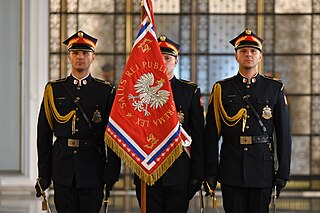
The Straż Marszałkowska, translated as the Marshal's Guard of the Sejm or the Marshal's Guard is a security unit that serves as the protection of the Marshal of the Sejm of the Polish Parliament. It also ensures that the order is maintained in parliament and that parliamentarians have a calm environment to work in. Besides its security role, it also participates in ceremonial military parades and official anniversary celebrations.
The year of 2021 is declared the Year of Stanisław Lem in Poland, according to the November 27, 2020 resolution of Sejm. It assigned several patrons for the year, so 2021 is to be known as the Stanisław Lem Year, Stefan Wyszyński Year, Cyprian Norwid Year, Krzysztof Kamil Baczyński Year, Tadeusz Różewicz Year, as well as the Constitution of 3 May Year in Poland. 2021 is the year of the 100th Stanisław Lem anniversary.

Sejm of Central Lithuania, also known as the Vilnius Sejm, or Wilno Sejm or the Adjudicating Sejm, was the parliament of the short-lived state of Central Lithuania. Formed after the elections of 8 January 1922, it held its proceedings from 1 February to 1 March of that year. It had 106 deputies. Dominated by Polish representatives, it requested Central Lithuania's annexation by Poland and dissolved shortly afterward.















